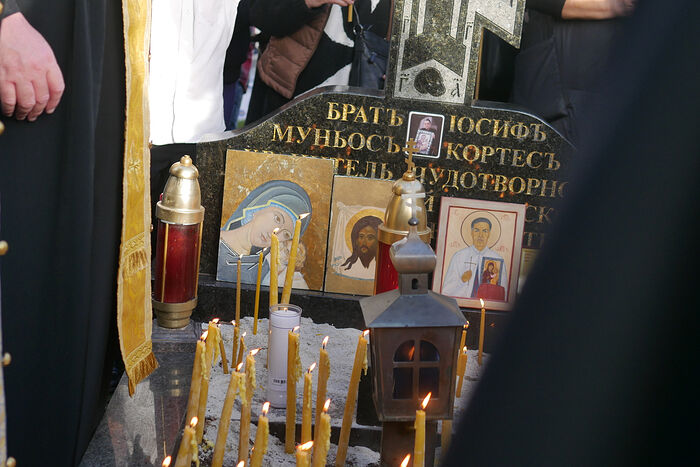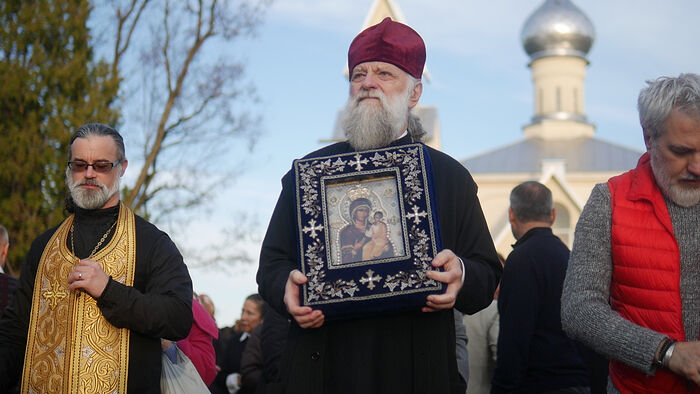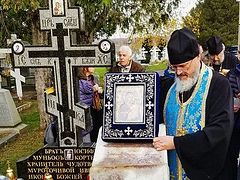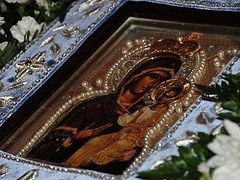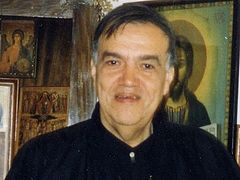2022 is a remarkable year for several reasons. This year, the children of the Church prayerfully mark the fifteenth anniversary of the reestablishment of eucharistic communion between the Russian Orthodox Church Outside of Russia and the Moscow Patriarchate (May 17, 2007), the fortieth anniversary of the appearance of the myrrh-streaming Montreal Iveron Icon of the Mother of God (November 24, 1982), the twenty-fifth anniversary of the martyric death of its guardian José Muñoz-Cortés (October 31, 1997), and the fifteenth anniversary of the appearance of the myrrh-streaming Hawaiian Iveron Icon of the Mother of God (October 6, 2007).
These milestone anniversaries lent special meaning to the twenty-fourth annual pilgrimage by Washington’s St. John the Baptist Cathedral to Holy Trinity Monastery, where José Muñoz-Cortés is buried.
Preparations for the pilgrimage trip were begun well before the event. Registration began immediately after the patronal feast of the Beheading of St. John the Baptist, and within days all of the spots on two buses were booked. Groceries and supplies needed to be purchased for our two-day visit to the “Diasporan Lavra,” and food prepared both for the many pilgrims, as well as for the brethren of Holy Trinity Monastery. This practice was established by Metropolitan Laurus (Škurla; +2008) from the very beginning of our annual pilgrimages, that our provisions might serve not only to organize a memorial meal for Brother José, but could also be given over to the monastery as a form of donation.
The Hawaiian Icon arrived on the eve of the feast of the Translation of the Iveron Icon to Moscow. It was brought Archpriest Athanasius Kone, rector of our parish in Hawaii, dedicated to the Montreal Icon. That same day, His Eminence Nikoloz (Nicholas), Metropolitan of Akhalkalaki, Kumurdo & Kari, arrived in Washington from the faraway Republic of Georgia. As His Eminence noted in his sermon in our church, he came to the U.S. in order to “bear witness to his veneration of two righteous saints of ROCOR—Hieromonk Seraphim (Rose) and José Muñoz-Cortés.”
On Wednesday, October 26, at 8:00 AM, Metropolitan Nikoloz celebrated Divine Liturgy in our church. Upon completion of the Liturgy, a short moleben was served before the wonderworking image and a reliquary with relics of the saints of the Kiev Caves Lavra, asking for the cessation of military conflict and the restoration of peace in the long-suffering Ukraine. After the moleben, Metropolitan Nikoloz delivered a sermon.
“In the Georgian Church, we honor Brother José as a holy martyr. We also honor as a righteous saint Fr. Seraphim (Rose). Canonization is a formal act. This act has not yet taken place, but despite this we, the faithful of Georgia, honor these two righteous ones as saints, and await a positive decision on the part of your hierarchy.”
Russian journalist and parishioner of St. John the Baptist Cathedral Dmitry Zlodorev recorded and interview with Metropolitan Nikoloz, which can be read here.
 Photo: Jordanville.org That evening, a moleben and akathist to the Most Holy Theotokos was served before her wonderworking Hawaiian Icon in St. John the Baptist Cathedral. A multitudinous gathering of the faithful, with hope in the aid of the Mother of God, were anointed with holy myrrh.
Photo: Jordanville.org That evening, a moleben and akathist to the Most Holy Theotokos was served before her wonderworking Hawaiian Icon in St. John the Baptist Cathedral. A multitudinous gathering of the faithful, with hope in the aid of the Mother of God, were anointed with holy myrrh.
On Friday, Deacon Nectarios Yangson, guardian of the Hawaiian Icon, arrived in Washington. That evening, another moleben was served before the icon, this time for those departing on Saturday for Holy Trinity Monastery, to the grace of the chosen one of the Mother of God, José Muñoz Cortés.
The following day, Saturday, October 29, a large group of pilgrims gathered at the church at 6:00 a.m. A huge quantity of provisions, as well as personal items, was loaded onto the two buses, which soon departed. Additionally, ten cars with pilgrims departed from Washington separately.
The journey from the capital to Jordanville is long (nearly seven hours), but thanks to prayers, fraternal fellowship, and religious discussions, the time flew by. Metropolitan Nikoloz led a spiritual talk on the bus about Brother José and his earthly struggles.
 Photo: Jordanville.org At 3:00 PM, the pilgrims arrived at the cemetery of Holy Trinity Monastery and began to prepare for the first panikhida for Brother José. The weather was splendid and sunny. Praying at the panikhida was the monastery abbot, Bishop Luke, along with monastery clerics and seminarians. Over 200 people from the U.S. and Canada prayed at the panikhida, honoring Brother José’s memory. Prior to the start of the panikhida, the Hawaiian Icon was brought to Brother José’s grave. When Fr. Victor removed the icon from its encasing, everyone immediately saw that its lower end was soaked and swollen: an abundance of myrrh flowed over Fr. Victor’s hands. When the icon was placed on the analogion nearby, the myrrh flowed in abundance over the white cloth cover, and literally within minutes a huge wet patch had formed, stretching to the bottom of the analogion. This is clearly visible in the photographs. As Fr. Nectarios explained, this always happens when the icon visits the gravesite of Brother José. Participants of our earlier pilgrimages have seen this miracle with their own eyes. This year, the streams of myrrh were especially abundant: the Heavenly moisture exuded not only from the icon’s kiot, but even from the top of the kiot’s glass
Photo: Jordanville.org At 3:00 PM, the pilgrims arrived at the cemetery of Holy Trinity Monastery and began to prepare for the first panikhida for Brother José. The weather was splendid and sunny. Praying at the panikhida was the monastery abbot, Bishop Luke, along with monastery clerics and seminarians. Over 200 people from the U.S. and Canada prayed at the panikhida, honoring Brother José’s memory. Prior to the start of the panikhida, the Hawaiian Icon was brought to Brother José’s grave. When Fr. Victor removed the icon from its encasing, everyone immediately saw that its lower end was soaked and swollen: an abundance of myrrh flowed over Fr. Victor’s hands. When the icon was placed on the analogion nearby, the myrrh flowed in abundance over the white cloth cover, and literally within minutes a huge wet patch had formed, stretching to the bottom of the analogion. This is clearly visible in the photographs. As Fr. Nectarios explained, this always happens when the icon visits the gravesite of Brother José. Participants of our earlier pilgrimages have seen this miracle with their own eyes. This year, the streams of myrrh were especially abundant: the Heavenly moisture exuded not only from the icon’s kiot, but even from the top of the kiot’s glass
What they saw instilled a feeling of piety, joy, and trepidation in everyone…
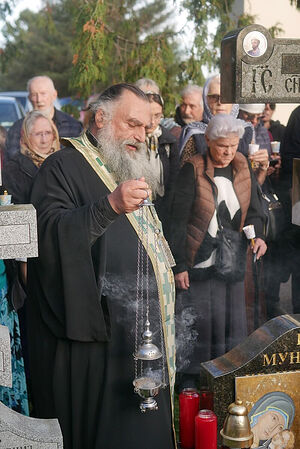 Photo: Jordanville.org The prayer service for the departed began, officiated by Metropolitan Nikoloz, co-served by seven priests. The worshippers sang the refrains. The service was performed in three languages—Church Slavonic, English, and Georgian. Not only was Brother José commemorated at the panikhida, but also Schema-Abbot Clement—who in 1982 gifted to Brother José the Iveron Icon, which would soon begin streaming myrrh—and Archbishop Leonty (Filippovich; †1971), who received José into Orthodoxy. Also commemorated was Metropolitan Hilarion (Kapral), who departed for the next life in May of this year, and who over the course of many years would visit Holy Trinity Monastery for these commemorative days.
Photo: Jordanville.org The prayer service for the departed began, officiated by Metropolitan Nikoloz, co-served by seven priests. The worshippers sang the refrains. The service was performed in three languages—Church Slavonic, English, and Georgian. Not only was Brother José commemorated at the panikhida, but also Schema-Abbot Clement—who in 1982 gifted to Brother José the Iveron Icon, which would soon begin streaming myrrh—and Archbishop Leonty (Filippovich; †1971), who received José into Orthodoxy. Also commemorated was Metropolitan Hilarion (Kapral), who departed for the next life in May of this year, and who over the course of many years would visit Holy Trinity Monastery for these commemorative days.
Upon completion of the panikhida, Fr. Victor delivered a sermon in which he reminisced about Brother José’s fifteen-year labor, which was crowned in 1997 with a martyric end. Fr. Victor noted that the manifestation of the myrrh-streaming Hawaiian Icon is a direct continuation of the miracle of the Montreal Iveron Icon.
After the panikhida, everyone present was anointed with holy myrrh from the Hawaiian Iveron Icon of the Queen of Heaven, and all those who wished to were given a piece of soil from José’s grave, a booklet with a canon and akathist to the Montreal Icon of the Mother of God, and a photo-icon of Brother José. A few words regarding this icon are appropriate here.
In September, we received a visit from His Eminence Victor, Archbishop of Artsiz, vicar of the Diocese of Odessa of the Ukrainian Orthodox Church. He celebrated Divine Liturgy in our cathedral on the feast of the Nativity of the Most Holy Theotokos. We presented him with a piece of Brother José’s hair and the clothing in which the martyr was buried. From Washington, Archbishop Victor drove to Jordanville, where he prayed at the Brother José’s grave. Upon his return to Ukraine, Archbishop Victor ordered a beautiful icon of Brother José from a local iconographer, and sent us a picture of it. We magnified it and distributed it to the pilgrims.
After the evening meal, the participants of the pilgrimage gathered in the monastery cathedral for the solemn three-hour monastic Vigil. Throughout the evening service, in the lower Church of Venerable Job of Pochaev, the rector of St. John the Baptist Cathedral Archpriest Victor Potapov and cathedral cleric Priest Damian Dantinne confessed pilgrims who expressed their desire to commune of Christ’s Holy Mysteries the following day.
 Met. Nikoloz serving in the monastery church. Photo: Jordanville.org
Met. Nikoloz serving in the monastery church. Photo: Jordanville.org
On Sunday, October 30, His Eminence, Metropolitan Nicholas, celebrated Divine Liturgy, co-served by Metropolitan Nikoloz, Bishop Luke, seventeen priests, and an array of deacons. This was Metropolitan Nicholas’ first Liturgy in Jordanville since his election as the new First Hierarch of the Russian Orthodox Church Outside of Russia. Virtually all of the worshippers communed. After the Prayer behind the Ambo, Archpriest Serge Lukianov, rector of St. Alexander Nevsky Cathedral in Howell, NJ, delivered a profound sermon dedicated to the Montreal Icon and Brother José.
Fr. Serge spoke to the worshippers about how Brother José converted to Orthodoxy at the hands of Archbishop Leonty and dreamed of traveling to Mount Athos. In 1982, in Holy Nativity Skete on Athos, he received the Iveron Icon, which on November 24 of the same year began to stream myrrh in his apartment in Montreal. Soon after this, the parishes in North America began to invite him to visit with the icon. How spiritually uplifting were these parish visits by the icon! During one of its visits to Howell, Brother José and the icon were spending the night at Fr. Serge’s home. At three o’clock in the morning, everyone awoke to a powerful smell and saw that the icon was streaming myrrh down the analogion. They woke Brother José, who came and said that the myrrh was streaming because so many parishioners had confessed their sins at Vigil and were preparing for Communion. He noted that sometimes he would come to a parish and the icon would remain dry, because there were so few communicants.
Prior to departing for the monastery, Fr. Serge continued, he went to visit a ninety-three-year-old parishioner named Ekaterina. She told him that she remembers well both the icon and Brother José. The year after his martyric death, she wanted to travel to his grave at the monastery cemetery but was worried about the long drive. She had suffered from a urinary tract infection for decades and was housebound. Suddenly, she decided to go, despite her husband’s reluctance. It was remarkable, Fr. Serge went on, that she made the journey, and after she requested a panikhida at the gravesite, she began to feel new strength and was healed. And for twenty-five years, she never once suffered from that illness again.
After the Sunday luncheon, the pilgrims remained in the large seminary hall to hear testimonials of various signs connected with the Iveron Montreal and Hawaiian Icons.
Fr. Victor opened the meeting. He turned the attention of those gathered to the hand-painted copy of the Montreal Icon, which had been displayed in the seminary hall as part of an exhibit of Brother José’s personal effects and proceeded to tell those present the history of this icon.
In early March 2002, a small group of ROCOR clergy visited Optina, where a meeting took place with the then-abbot of St. John the Forerunner Skete Hieromonk Tikhon and his assistant Hieromonk Michael. Fr. Michael had at one point received several icon boards that had belonged to the murdered Brother José Muñoz-Cortés, which had been preserved in Fr. Victor’s home after Brother José’s martyric death. These boards were given to Optina because of the reverence the monks of the monastery have for Brother José, considering him a brother in Christ (José’s Heavenly patron in his secret tonsure was Venerable Ambrose of Optina). On one of these boards, Fr. Michael ordered an exact copy of the myrrh-streaming Montreal Iveron Icon of the Mother of God. Fr. Michael told the visitors from America that the icon had by that time been streaming myrrh for three months. The priests saw this with their own eyes when Fr. Michael brought the icon to the church from his cell. Having prayed before the icon, the priests bade Fr. Michael farewell and went further to examine the skete.
Having viewed the skete’s house that had belonged to the Venerable Elder Ambrose, the priests wanted to leave the skete and return to the monastery but were delayed by the skete’s beautiful gates. Unexpectedly, a man ran out to Fr. Victor and asked him and Matushka to return to the skete. Fr. Michael came out to meet them and presented the Iveron Icon to Fr. Victor, telling him that the icon must return with them to his parish in Washington. Fr. Victor took the icon, and Fr. Michael turned and departed in silence.
Since that time, the “Optina” Icon had occupied a place of honor on the left kliros of St. John the Baptist Cathedral in Washington. Several years ago, Fr. Victor entrusted the icon to the guardianship of the sisters of St. Elizabeth Skete in Jordanville, were it remains to this day.
Fr. Victor then read excerpts from the nearly universally forgotten penitent epistle of the Synod of the Russian Church Abroad, entitled “Appeal to the Flock on the 20th Anniversary of the myrrh- streaming Iveron Icon of the Mother of God.” The most important words contained with it are these:
“This icon, which abundantly streamed [wonder]working myrrh for fifteen years, consoled our Russian Church Abroad, a visible and tangible symbol of the mercy of the intercession of the Mother of God for us sinners… Did we act in a worthy manner during the presence in our Church of this icon, which clearly performed miracles?
“Did we put to good use this visitation of the Mother of our Lord for our souls, and is it not our collective sin of having grown cold towards this holy icon and in our prayers, cold to the works of charity and witness to the Orthodox Faith, that was the reason for its disappearance, through God’s will?
“With tremulous gratitude we prayerfully recall the arrival of this wondrous myrrh-streaming icon in our Church, and with repentance we pray to the Most Holy Mother of God for the forgiveness of our transgressions, for peace to reign in our Orthodox Church…”
Metropolitan Nikoloz then spoke, repeating the thought he had already expressed above regarding the need to take real action in the matter of the glorification of the three God-pleasing saints of the twentieth century: Brother José, Hieromonk Seraphim (Rose), and the Romanian confessor of the Faith Priest George Calciu.
Speaking after the Georgian Metropolitan was Fr. Nectarios Yangson. I hope to type up his wonderful presentation and publish it separately on this site.
Mother Theodora from the women’s Skete of the Holy New Martyr Elizabeth neighboring Holy Trinity Monastery further spoke to all about the miraculous appearance of fire that came from the ground at Brother José’s gravesite. On October 30, 2016, on the eve of the anniversary of Brother José’s murder, the traditional farewell panikhida had been served. A multitude of candles had been lit at Brother José’s grave. Here are the words of Mother Theodora:
“‘Blessed is our God, always, now and ever, and unto the ages of ages.’ And suddenly—rain: stubborn and enough to soak through one’s clothes The people stood under umbrellas, but the candles on Brother Jose’s grave were not extinguished. As the pilgrims departed, the candles continued to burn.
“And at 5 o’clock in the evening, when Abbess Elizabeth and I came once more to the grave, the candles were still burning. “We decided to return once more at six o’clock, almost certain that the candles would be extinguished under the strengthening rain.
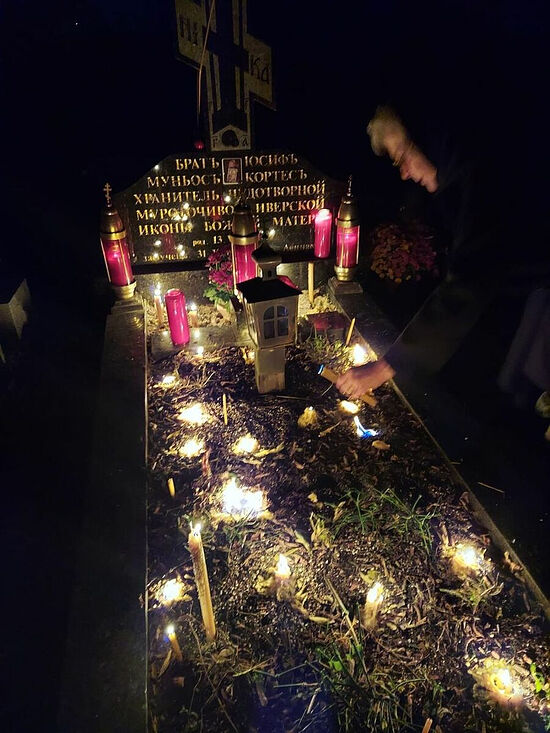 The grave of Brother Jose. Photo: Eastern American Diocese, ROCOR
The grave of Brother Jose. Photo: Eastern American Diocese, ROCOR
“It grows dark early now, and here in the total darkness of the cemetery we saw it—the victorious Paschal flames at the grave of the martyr, whose entire life had become a witness to fidelity, love, and the strength of the Spirit. In the dark, it was difficult to determine what precisely was burning. It seems at first as though the wet ground itself was aflame, or else that the fire was emanating from the melted wax now mixed in with it. Soft blue tongues of flame flickered above the ground. We stood for a long time before the grave. The tall candles had long since gone out, but in places there were pockets in the ground, which had not preserved even a trace of the candle, but which were encircled with flat waxen crowns. Our companion added his commentary to the film: ‘It has been raining all day, and despite this, the ground is still aflame. It seems as though the fire is rising directly out of the ground…’ And he went silent, not daring to speak aloud the idea that the flames were alight in our hearts and were they no metaphor.
“Love emanated from Brother Jose’s grave; all around is darkness and cold rain, even our souls would not find warmth and here—Paschal fire emanating from the grave, calling us to spiritual awakening and love.
“And the Light shineth in darkness; and the darkness comprehended it not (John 1:5).”
To confirm Mother Theodora’s account, a video recording was shown of the candles burning in the rain at night.
After our short conference, at four o’clock, the pilgrims gathered once more in the cemetery at Brother José’s grave for a farewell panikhida. The neatly cleaned gravesite, as always, was covered by worshippers in a multitude of candles.
Spiritually enriched by their visit to Holy Trinity Monastery and the warm brotherly interaction, the pilgrims did not even notice how quickly the seven-hour ride home flew by.
God grant that, with time, an ever-greater number of people will visit and support the holy habitation named for the Most-Holy Trinity and the burial site of the chosen one of the Mother of God, and may the Lord grant that the blessed day will arrive when Brother Jose, the last Orthodox martyr of the twentieth century, will be glorified among the assembly of the holy martyrs.
***
This is where I intended to end my testimonial, but just at this moment, the mailman came with a parcel from France, from an anonymous servant of God. In it were placed several booklets, beautifully published on glossy paper, entitled “A Service to the Holy New-Martyr José, Guardian of the Myrrh-Streaming Iveron Icon of the Most Holy Theotokos.”
The parcel also included an icon of Brother José. Truly, marvelous are Thy works, O Lord!

